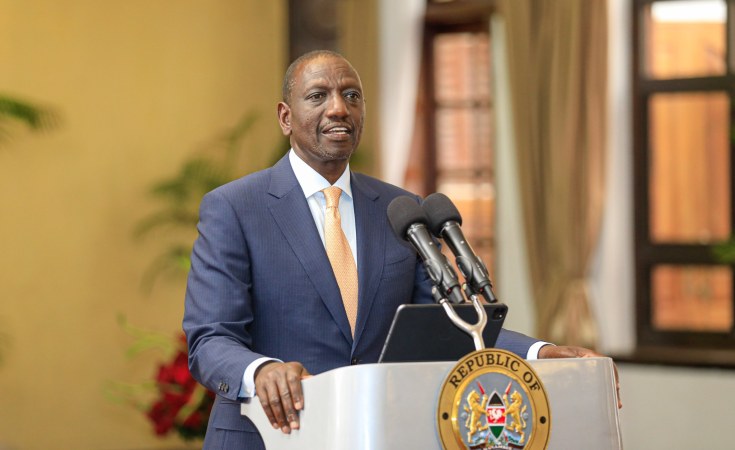Kenyan President William Ruto says Nairobi has met all legal and constitutional requirements to deploy troops to Haiti to help the Caribbean nation out of political and socioeconomic turmoil.
In an exclusive interview with VOA's Hubbah Abdi shortly after concluding his state visit to the United States last week, Ruto said the East African nation "will show up in Haiti" as it has historically done for more than a dozen other countries to support peace efforts.
"Haiti is not going to be an exception," he noted.
The Kenyan leader also addressed criticisms surrounding the cost of his recent U.S. trip, which some media organizations said was $1.5 million.
This interview has been edited for clarity and brevity.
VOA: You suggested that developing countries, especially in Africa, need support to offset debts. But Kenya has borrowed about $6 billion since former President Mwai Kibak's administration that ended in 2013. What are you expecting from the United States in terms of help on this debt burden?
Kenyan President William Ruto: The conversation that we had with the United States is that they will lead, and they will champion. And we appreciate that everybody has now come to agree that we need a fairer international financial architecture.
It is the reason why the United States [has] committed $250 billion, and specifically, $21 billion to the concessionary window of the World Bank under the IDA [International Development Association] so that we can reach the target we set in Nairobi of $120 billion that will support developing countries ... like Kenya [to] access concessionary financing so that countries do not spend more in debt repayment and in managing the effects of climate change.
But they will spend more in development, in health, education, and social services. And I am very proud of the outcome of my meeting with President [Joe] Biden and by extension, the U.S. government. Both President Biden and the senators, congressmen have agreed to double U.S. contribution to IDA so that we can be able to do more with our resources and be able to access more concessionary funding for the development of our countries."
VOA: Your government defended spending $1.5 million for this trip. But Kenyans at home say you overspent, while asking them to tighten their belts to help the economy recover. How do you respond to this?
Ruto: The numbers being bandied around are ridiculous, to say the least. I think the expenditures on my trip are completely exaggerated. I am very careful about the resources that I spend. In fact, I have cut down on funding to my office. I have cut down on funding to different government agencies. I have reduced by 30% recurrent expenditures in this budget so that we can live within our means, as I have said, and we can push more resources to the realm of development, education, providing help and doing the things that matter like cash transfers to citizens.
VOA: Would you like to see more changes to the African Growth and Opportunity Act, which was created to improve economic relations with the U.S. and sub-Saharan African countries?
Ruto: I think AGOA is working pretty well, even in its current form. For example, last year, Kenya exported $544 million -- close to 70 to 80 billion [Kenyan shillings] worth of goods to the United States -- quota free, duty free. I think last year, we added 12,000 jobs under this program. ... We're making huge progress in making sure that Kenyan products can have access to American markets the same way we have negotiated the Economic Partnership Agreement with the European Union to facilitate trade and access to market for goods from Kenya.
VOA: The U.S. has reaffirmed its support for Kenya to deploy troops to Haiti. But the U.S. and other countries have refrained from sending their troops there. In Kenya, there's an active case in court regarding this deployment. Why are you still determined to send troops to Haiti?
Ruto: The deployment of our security officers to Haiti has been endorsed by the Cabinet. Both houses of parliament have ratified it. We have met all international requirements, and in fact, we have complied with the very court order you're referring to.
The court asked us to have an agreement signed between Kenya and Haiti specifically to facilitate this deployment. The prime minister of Haiti [Ariel Henry] traveled to Kenya, and we jointly witnessed the signing of that agreement.
Beyond that, I have also asked the Transitional Presidential Council in Haiti to ratify and confirm that they recognize the agreement that was signed between Kenya and witnessed by the former prime minister and myself. I have it in writing that they confirm that the current administration recognizes that agreement. So, we are very clear, and I am very clear in my mind that Kenya has satisfied all legal, constitutional and international obligations to facilitate the deployment of this police contingent.
We believe that the responsibility in Haiti belongs to all countries and all people who believe in self-determination, democracy, the rule of law and peace. We will show up in Haiti the same way we have done in other countries. Kenya has been in 47 other countries supporting peace, and Haiti is not going to be an exception.
This story originated in VOA's English to Africa Service, with contributions from Ignatius Annor.


